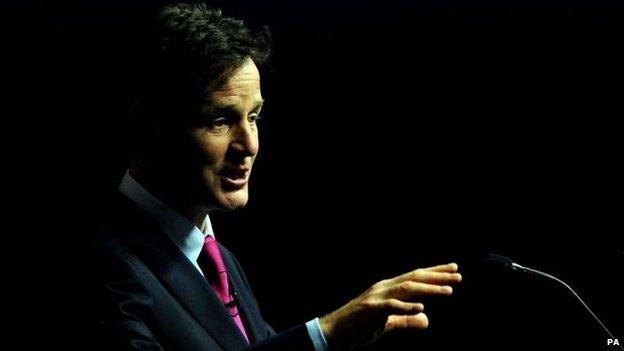Nick Clegg alters stance on MEP powers
- Published

This morning on the Today programme, Deputy Prime Minister Nick Clegg made very clear that he was opposed to the European Parliament deciding the next president of the European Commission.
He said: "I have long been very firm in my view that it would set a bad precedent - never mind for Britain - for Europe if you set a precedent that, from now on in, the president of this very important body, the European Commission, in effect becomes a choice entirely made by the European Parliament.
"When everyone solemnly agreed the last set of rule changes in the EU, the Lisbon Treaty, it was clearly stated that this was a decision to be decided by democratically elected heads of governments, not unilaterally decided upon by the European Parliament.
"What I want is for national governments to retain their rights to decide who this is."
So, that is clear enough. Except that my eagle-eyed colleague, Adam Bowen, has remembered that this was not always Mr Clegg's view.
In 2003, when he was still an MEP, Mr Clegg published a pamphlet for the Foreign Policy Centre think tank with Dutch MEP Michiel van Hulten entitled "Reforming the European Parliament". In it, they argued strongly that the European Parliament should take on new powers to scrutinise the European Commission.
In particular, they wrote: "The President of the European Commission should be directly elected by the European Parliament.
"The election should be confirmed by the European Council on the basis of a decision taken by qualified majority.
"This combination would guarantee two things: first, that the fate of the Parliament becomes inextricably linked with that of the European Commission, and that the majority who elected the President of the Commission has every interest in helping them make their term of office a success.
"This would require Parliament to operate in a more self-disciplined manner than has hitherto been the case.
"Second, as the Council would have to ratify the election, the President elected by Parliament would have to be a politician who can command a broad range of support.
"If Parliament were to opt for a less mainstream candidate, a Council veto would become very likely, forcing Parliament to reconsider its choice."
In other words, the European parliament should elect the commission president and the heads of government could only block it if they got a qualified majority against the nominee.
See page 26 in the main body of the text, external if you want to read the whole argument.
A spokesman for Mr Clegg said that much had changed between now and then and the deputy prime minister did not want to unstitch the rules established by the Lisbon Treaty.
"This was 2003. Things have changed substantially, most obviously with what was agreed in the Lisbon Treaty," he said.
"This made very clear that it was for national governments to decide on the presidency of the European commission, not the European parliament. What was agreed in the Lisbon Treaty should be stuck to and not unstitched."
- Published29 May 2014
- Published15 May 2014